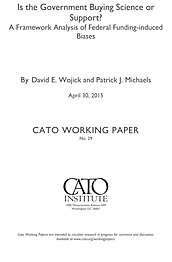Federal agencies spend many billion dollars a year on scientific research. Most of this is directly tied to the funding agency mission and existing policies. The issue is whether these financial ties lead to bias in favor of the existing policies, as well as to promoting new policies. Is the government buying science or support?
Our working definition of “funding-induced bias” is any scientific activity where the prospect of funding influences the result in a way that benefits the funder.
While the basic concept of funding-induced bias is simple, the potential forms that this bias might take are far from simple. Science is a complex social system and funding is a major driver. In order to facilitate research into Federal funding and bias it is necessary to isolate specific kinds of bias. Thus the framework presented here is a taxonomy of funding-induced bias.
For the purposes of future research the concept of funding-induced bias is analyzed in the following ways:
1) the practices in science where bias can occur,
2) how agency policy can create bias,
3) the level at which bias is fostered, and
4) indicators of bias.
Fifteen different scientific practices are analyzed, ranging from the budgeting and funding for research to the publishing and communication of results. For each of the fifteen practices there is a snapshot of the existing research literature on bias, plus a brief discussion of the directions that new research might take in looking into funding-induced bias. The potential for quantifying the extent of bias is also addressed.
In order to provide examples along the way there is a special focus on climate change. Federal policies on climate change and federal funding of climate research are both extensive. The linkage between these policies and research has become a major topic of discussion, including numerous allegations of bias.
The research framework provided here applies to the study of all funding-induced bias in science, not just to climate change science. The linkages between Federal policy and federally funded science are extensive and not well understood. Moreover, these linkages have policy implications, especially if they are inducing bias in scientific research. However, policy is not our topic here. Rather we are addressing the needed research that might lead to new policies.
In this report we are mostly concerned with individual types of funding induced bias. But there is an intrinsic sequence to the various biases we have identified and this raises the possibility of cascading amplification. By amplification we mean one biased activity is followed by another, such that the first bias is increased.
A simple, and perhaps common, example of amplification might be when the hype in a press release is exaggerated in a news story. Let’s say the press release overstates the importance of the research result, but with some qualification. The news story then reports the result as a great breakthrough, far more strongly than the press release, ignoring the latter’s qualifications. In this way the original bias has been amplified.
Cascading amplification when one biased activity is followed by multiple instances of amplification. Using our example, suppose a single biased press release generates many different news stories, which vie with one another for exaggeration. This one-to-many amplification is properly termed a cascade.
Moreover, there is the possibility of cascading amplification on a very large scale and over multiple biased stages. Here is an example of how it might work.
1) An agency receives biased funding for research from Congress.
2) They issue multiple biased Requests for Proposals (RFPs), and
3) multiple biased projects are selected for each RFP.
4) Many projects produce multiple biased articles, press releases, etc,
5) many of these articles and releases generate multiple biased news stories, and
6) the resulting amplified bias is communicated to the public on a large scale.
One can see how in this instance a single funding activity, the agency budget, might eventually lead to hundreds or thousands of hyperbolic news stories. This would be a very large scale cascading amplification of funding-induced bias.
Climate Change Examples
In the climate change debate there have been allegations of bias at each of the stages described above. Taken together this suggests the possibility that just such a large scale amplifying cascade has occurred or is occurring. Systematic research is needed to determine if this is actually the case.
The notion of cascading systemic bias, induced by government funding, does not appear to have been studied much. This may be a big gap in research on science. Moreover, if this sort of bias is indeed widespread then there are serious implications for new policies, both at the Federal level and within the scientific community itself.
